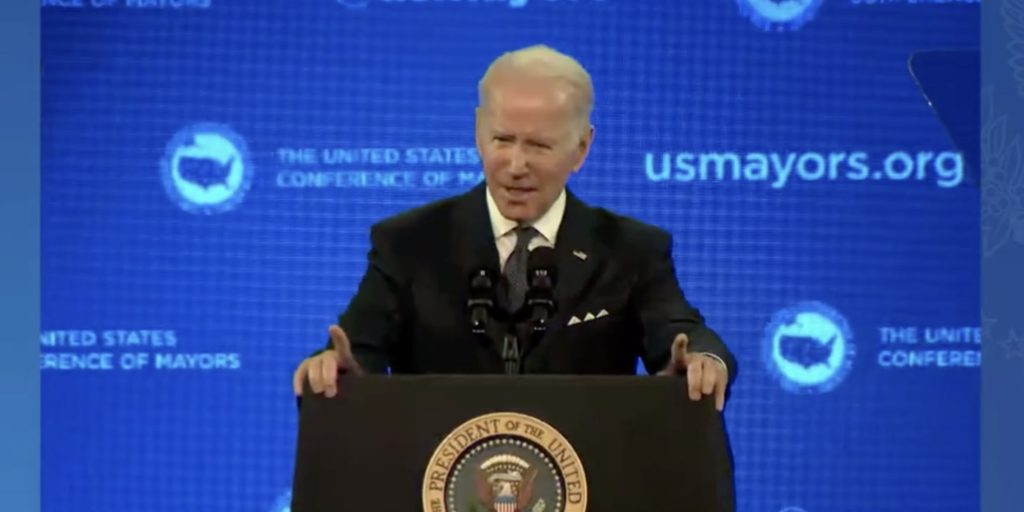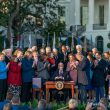U.S. Conference of Mayors winter meeting features Pres. Biden, Speaker Pelosi; highlights challenges, success
Between balancing budgets drawn taut by the ongoing pandemic to addressing community concerns about policing, managing vaccine drives and overseeing infrastructure projects newly funded through the bipartisan infrastructure bill, America’s mayors have a lot on their plate heading into 2022—and that’s not considering daily tasks like ensuring trash is picked up on schedule.
The U.S. Conference of Mayors’ 90th annual Winter Meeting, held last week at the Capital Hilton in Washington, D.C., highlighted these and other challenges overcome by city leaders over the past year, and recognized their ability to bring neighbors together during a particularly tumultuous time in national politics. The conference featured many notable speakers including Pres. Joe Biden. Amid this pandemic-marked era, speakers looked to the future with optimism and grit.
“A pandemic; a massive economic meltdown; social unrest; rising violence. Through it all, we persevere because we must,” said Chicago Mayor Lori Lightfoot at the conference’s opening briefing. “Everything runs through cities: the GDP; making sure we’re getting our children back to education in person. COVID-19 has disproportionately affected Black and brown people in our cities. Even though we’ve been broken a little bit, we must move forward.”
One notable theme repeated by many who spoke during the four-day conference touched on the resurgence of cities and their importance to the nation’s democratic health. During a time that will be remembered for its partisan divide, mayors have brought bring people together around common goals pertinent to their everyday life, said Miami Mayor Francis Suarez, who serves as president of the U.S. Conference of Mayors. The conference represents more than 1,400 American mayors of cities with a population more than 30,000 people.
“There are three parties in America—there are Republicans, there are Democrats and there are mayors. That is an idea that’s embedded deep in our soul. It’s what makes mayors different. We are a bipartisan organization that serve the people first,” Suarez said.
The event included presentations and roundtable discussions with 10 members of the Biden Administration’s. Along with Biden, they were Treasury Sec. Janet Yellen, Health and Human Services Sec. Xavier Becerra, Department of Homeland Security Sec. Alejandro Mayorkas, Labor Sec. Marty Walsh, Education Sec. Miguel Cardona, Transportation Sec. Pete Buttigieg, Commerce Sec. Gina Raimondo, Housing and Urban Development Sec. Marcia Fudge, Attorney General Merrick Garland and EPA Administrator Michael Regan.
Closing out the conference with final comments Friday, Biden commended the mayors on their resilience in facing down unprecedented challenges over the last several years, encouraging those in attendance to “keep it going folks, we need you badly. We need you badly.”
Over the last year, “we’ve gone from 2 million shots … to 210 million Americans fully vaccinated, and you mayors have been critical partners—I’m not trying to be nice to you, it’s a fact,” Biden said. “In Richmond, Mayor (Levar) Stoney, you created vaccination clinics that doubled as job fairs. In Detroit, Mayor (Mike) Duggan partnered with saloons and barbershops to get shots into peoples’ arms. In St. Louis, Mayor (Tishaura) Jones joined with churches and local food programs to reach neighborhoods with low vaccination rates. In all of these efforts, you’ve saved lives.”
While touting the Build Back Better Act and the John R. Lewis Voting Rights Advancement Act, neither of which have passed through the Senate, he also thanked mayors for their role in helping to pass the American Rescue Plan and the infrastructure package, encouraging them to take advantage of the federal funding available to cities through the measures.
Among the conference’s various break-out sessions during the week, New Bedford (Mass.) Mayor Jon Mitchell moderated a discussion with the Energy Standing Committee that focused on new clean energy grants and loans funded by the Infrastructure Investment and Jobs Act (IIJA). And Cybersecurity and Infrastructure Security Agency Director Jen Easterly joined Austin Mayor Steve Adler’s Technology and Innovation Task Force to discuss how cities can better be prepared for cyberattacks, a statement from the organization says.
At a luncheon Thursday, Sec. Buttigieg explained how cities can access the $600 billion in transportation and infrastructure funds included in the infrastructure bill. Buttigieg stressed the role of cities in driving change and innovation, stating, “When I was a mayor, I was convinced that local government is the level that gets the most done… Now that I’m a cabinet official, I know that to be true,” according to the statement.
Other speakers who presented at the association’s annual winter meeting included House Speaker Nancy Pelosi and House Minority Leader Kevin McCarthy, among mayors from across the United States.




















